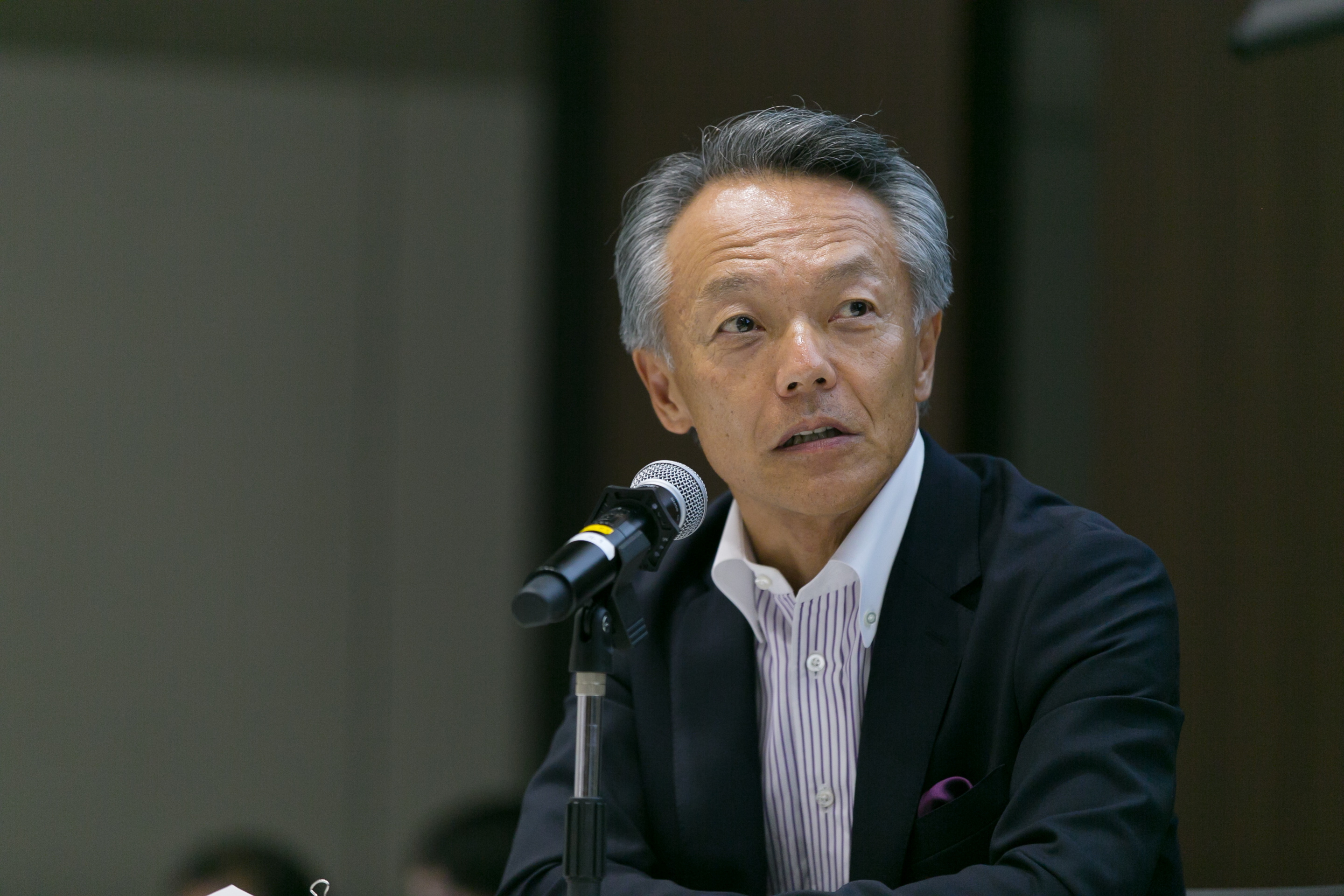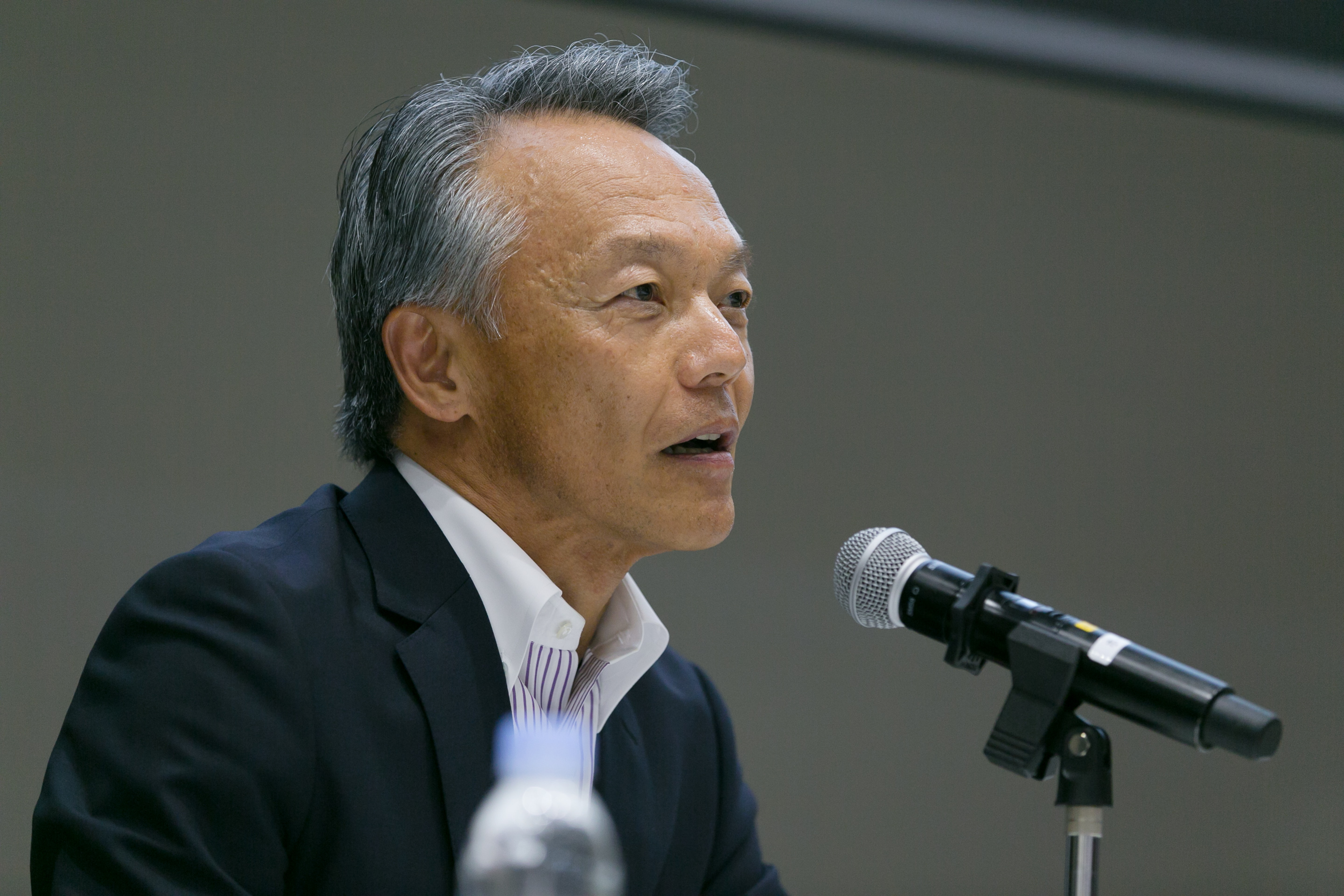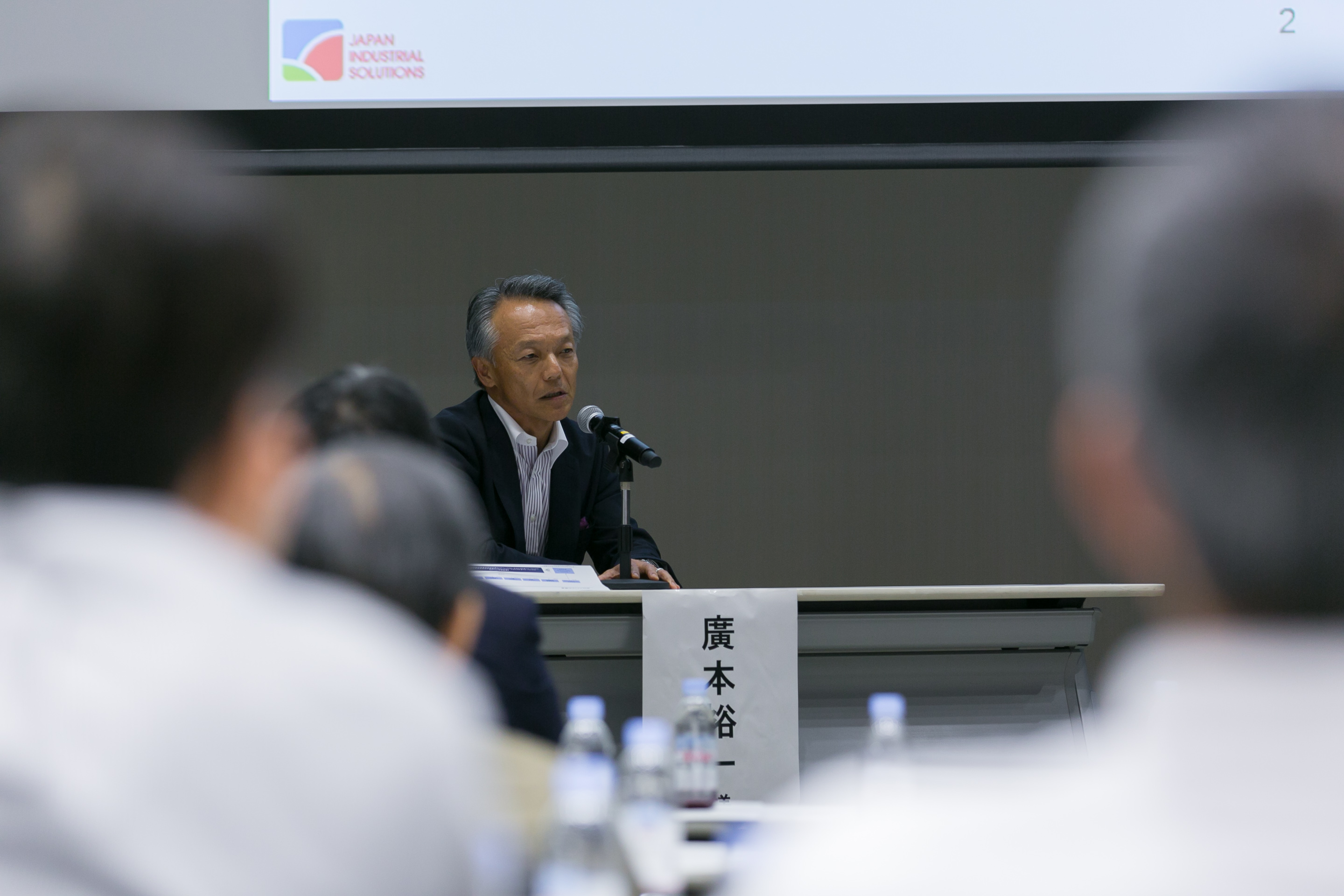Yuichi Hiromoto

- Classification
- Evolving Investment Opportunities
- Company
- Japan Industrial Solutions Co., Ltd.
Mr. Yuichi Hiromoto has more than 25 years of widely-ranged investment experiences at Mitsubishi Corporation as EVP, Group COO at Industrial Finance, Logistics & Development Group, SVP, Division COO at Industrial Finance Division, as well as Founder & CEO at Mitsubishi Corp.-UBS Realty, Inc., one of the largest J-REIT asset managers in Japan. Mr. Hiromoto earned a bachelor degree of law from the University of Tokyo, and an MBA degree from the Wharton School at the University of Pennsylvania.
- "Truth resides in detail"
- "Bad News First"
- "Investment is the future prediction."
- "Management relies upon a person and mutual understanding and trust can move people."
- "Other People's Money, Other People's Services"

We are committed to the restructuring and reorganization of individual businesses, companies, and industries while setting the ultimate goal of improving the global competitiveness of Japanese industry. We aim for steady improvement of corporate value by providing support to investee companies in their governance and also in their strengthening business management, formulating growth strategy, improving production process and others by dispatching our experts while working with the Japan’s 3 mega banks as well as the Development Bank of Japan, which are our sponsors.
Since the inception of our 100 billion yen fund, JIS I, in November 2010, we have invested in 10 major companies, nine of which are listed on TSE, in the form of non-voting shares, and have exited from 8 investments all with profits.
We have been constantly increasing the corporate value of our investee companies by;
1) conducting tighter corporate governance,
2) supporting their business administration with higher transparency,
3) facilitating their growth strategies, and
4) improving their manufacturing/sales procedures
Even in the form of non-voting shares, we take up at least one seat in the Board of Directors, and we also dispatch our own experts into those companies, typically at Corporate Planning Division, as well as at major manufacturing plants and/or Sales Division.
When making individual investment decisions, we will conduct thorough industrial research and future simulation on the industry in which the investee company belongs. In addition, upon working on the management improvement after investment, we will start with improvement of balance sheet by revising borrowing terms, cash flow management, and visualization of management in a collected effort across the three parties, i.e., the main bank, the investee company’s management team and us. At the same time, we will narrow down the next growth areas through close discussions with top management of the investee company, while promoting sales policy reform, improvement activities in manufacturing sites by making use of our experts that we dispatch to the investee company.
In respect of Japan’s industries, the number of players participating in the shrinking domestic market due to the aging population & lowering birth rate, remains unchanged. Every industry has faced an urgent issue of 'industry downsizing' to survive for the future. Downsizing inevitably involves temporary accounting loss treatment, including disposal of equipment & facility, impairment accounting, and staff reduction. In those cases, someone like JIS fills up necessary equity by underwriting newly issued shares to smooth out such downsizing process. Such investment opportunities seem to be increasing for “structural” reasons in Japan.
On the other hand, shifting their focus from the shrinking domestic market, many companies have sought growth opportunities in overseas markets such as Asia, by taking over companies or by forming alliance/JV with foreign partners. Unfortunately, however, there are many failed efforts of acquisition and operation of foreign entities, and there seems no end to it. These efforts are undermined by the Japan’s unique management systems including the personnel and remuneration system that Japanese companies have embraced for a long time, such as lifetime employment and seniority system. Even such cases involve temporary impairment accounting losses. This is the time when our funds come in.
In many cases, we handle large-scale public companies, and need to be highly sensitive to other stakeholders including incumbent shareholders. That is one of the reasons for us to undertake non-voting shares rather than ordinary shares. In such a context, PE funds’ methodology is very critical for us to provide appropriate solutions for our investee companies.

Over the past twenty years at Mitsubishi Corporation, I initiated “Industrial Finance Group” by setting up a variety of new investment funds, starting from public J-REITs (Japan Retail Fund 8953.T, Industrial & Infrastructure Fund 3249.T), private REITs, Infrastructure Funds, PE Funds, and a venture capital fund in Silicon Valley. By doing so, I am very much proud of having provided new asset classes for the sake of a wide range of investors including institutional investors, and contributed to more diversified investment portfolio than before, and lowered overall volatility.
In respect of the PE industry in Japan, of these alternative assets, the total fund value and the number of controlling companies are limited, compared with the countries in the West and the US. For the reason, the growth potential is very large compared with the economic scale of Japan. In addition, the traditional employment practices that have continued across Japanese corporate society are gradually collapsing. There is also a shift in the trend. Excellent talent tended to concentrate on traditional companies in the past. Now, a climate is gradually being fostered where more creative talents are seeking flexible employment opportunities, or young generation is launching new businesses. In order to provide such talented persons with a place to play an active role, I believe that the significance of PE funds to increase its scale and the number of controlling corporations is very high.
Let me pick up some of my beliefs that I have gained through my long-term experiences.
I keep listening to voices from the front line, or “Gemba,” assuming that any small event can be a sign of major change.
I welcome people who deliver bad news or who talk about something that I’d rather like to avoid. I should not forget to be grateful to those who brought bad news.
Always update global trend changes, industry trends, macroeconomic indicators, demographics without losing a bird’s eye view, and waiting while updating the image after 10 years.
As long as trust is maintained, people can move things and companies can change.
We put first priority on the fiduciary duty for the sake of investors, among our code of conducts, and we commit to behave ourselves and keep high degree of accountability. Upon initiating individual projects, we will actively utilize competent external experts and services, not only in-house resources such as human resources and expertise.

When making individual investment decisions, we will conduct thorough industrial research and future simulation on the industry in which the investee company belongs. Especially in the case of investment in class shares, which is our strength, we usually set a time frame of three years to achieve the corporate reconstruction, and thoroughly discuss management strategy with the investee company’s top management. At the same time, we will closely monitor monthly trends while paying close attention to cash flow generation capacity for each business field, and strictly follow up whether certain amount of cash, or "redemption funds," necessary to repurchase class shares is available.
In the unlikely event where the business of the investee company deteriorates unexpectedly, we will convert our class shares to ordinary shares and become a majority shareholder. Then, I will lead our staff as a member of management and step into its daily management. We will devote all of our heart and soul, as well as our exceptional experiences and expertise, to make its business restructuring successful, even under such difficult situation.

"The Hard Things About Hard Things" by Ben Horowitz
Biology of Ben Horowitz, co-founder of Andreesen & Horowitz which is the most influential venture fund in Silicon Valley today. This is a story of a person who started up an IT company by himself and launched A & H with the gain of selling the IT company. It tells how he started a business, and how he brought the business to success by overcoming ordeal and hardship. This is not a typical success story. Numerous difficulties and failures were uncovered. The highlights are in the latter part of the story in which his valuable philosophy about how to face with a start-up company and how he fostered it as a venture capitalist in light of his own entrepreneurial experience is shared with the readers. The true accounts that can be applied to all entrepreneurs, venture funds, and PE funds are described with abundant examples.
“Nikkei Newspaper”, “Wall Street Journal, “Mergermarket” for gathering industry information and sometimes “FT”, online “Diamond” columns written by Hajime Yamazaki and Yoichi Takahashi, weekly “Nikkei Veritas”, monthly “Sentaku”, “Facta”, “Inside Line” and others.
Notes:
This article originally appeared on Sep 22, 2017. Any views presented in this article are as of such date and are subject to change.
This article and the information provided therein are not a recommendation to purchase or sell any security, nor are they intended to constitute the marketing of, or a solicitation for investment in, any investment product.
Japan Industrial Solutions Co., Ltd. (JIS) was established in September 2010, with the support of Development Bank of Japan Inc., Mizuho Corporate Bank (now Mizuho Bank, Ltd.), Sumitomo Mitsui Banking Corporation, The Bank of Tokyo-Mitsubishi UFJ, Ltd ., and Mitsubishi Corporation. JIS started its first fund, JIS I, of 100 billion yen (upsized in 2013) in November 2010 and deployed it to a total of 9 Japanese firms. 8 of them has been already exited with profits, while JIS has successfully improved the corporate value of investee companies. JIS is now raising its second fund, JIS II, targeting total size of 200 billion yen. (as of August 2017)
JIS primarily invests in publicly listed companies or companies with relatively large revenues by making the best use of its major shareholders’ (3 mega banks & DBJ) networks for our deal sourcing.
JIS makes full use of its extensive knowledge and experiences in finance, business, consulting, corporate governance, and corporate turnarounds. JIS starts with assistance to restructure debt program of its investee companies in collaboration with its “main bank” which is one of JIS’s shareholders.
JIS has been constantly enhancing the corporate value of its investee companies by;
1) conducting tighter corporate governance,
2) supporting their business administration with higher transparency,
3) facilitating their growth strategies, and
4) improving their manufacturing/sales procedures
Even in the form of non-voting shares, JIS takes up at least one seat in the Board of Directors, and JIS also dispatches its own experts into those companies, typically at Corporate Planning Division, as well as at major manufacturing plants and/or Sales Division.

September 22, 2017
by Investment in Japan

